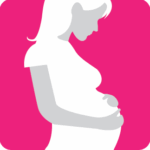

Group B Streptococcus is a bacterium that is commonly found in pregnant women. It is only occasionally a problem for the baby. Treatment is offered in labour to women found to have GBS to reduce the risk of problems in the newborn period.
In line with national guidance, we do not offer routine screening for GBS. One of the reasons for this is that it does not identify all women who carry GBS.
Preventative treatment (antibiotic treatment into a mother’s vein) reduces the risk of baby having problems by up to 90%. This treatment is most effective if it is given at least 2 hours before the baby is delivered. At Bradford Teaching Hospitals we usually arrange this treatment when:
It is very important that if you think you are in labour and you are a carrier of GBS, you should immediately contact the Maternity Assessment Centre or Labour Ward. Coming to hospital early will give us the best chance of giving treatment early enough for your baby to get maximum benefit.
The neonatologists (doctors specialising in caring for newborn babies) will review the situation and decide if baby needs further treatment. Baby may need intravenous antibiotics, which can be given on the postnatal ward. When we give antibiotics to baby it is to make sure baby stays well. Once antibiotics are started, they are usually given for two days. If baby doesn’t require antibiotics, they will require a period of observation in hospital to make sure they stay well before they go home.
No. We would not be able to give you antibiotics and therefore would not recommend it.
Yes, you could. There is no evidence that using water during labour or giving birth in water increases the likelihood of your baby having GBS. If you access our labour ward you may have antibiotics and use the pool.
Babies with GBS infection are sometimes very unwell and need intensive care in the Neonatal Unit. This can be to help with their breathing, their blood pressure, feeding and antibiotics. Most babies make a full recovery, although some babies can be left with problems. Sadly 5 to 10% of babies who develop early onset GBS infection will die, commonly from septicaemia (blood poisoning), pneumonia (infection of the lung) or meningitis (infection of the meninges of the brain).
If you carried GBS (or if your baby was thought at increased risk of GBS illness) and you had appropriate treatment, the risk to your baby is much reduced. However, despite our best efforts to prevent GBS illness, we know that some babies will still get ill.
Babies are more commonly ill with GBS in the days after the birth, but GBS and other bacteria can sometimes make babies ill even up to 3 months of age. It can be hard to know if a baby is unwell, particularly if you have not had a baby before.
If your baby shows these or other signs that worry you, do not delay. Seek urgent medical advice from your midwife, doctor, out of hours service (via NHS 111), Maternity Assessment Centre, Labour ward or the nearest Emergency Department.
If GBS is found in your urine, you will need a course of antibiotics to treat it immediately and you will also require antibiotics through a drip in labour. If it is found on a vaginal swab, you will not need treatment immediately. This is because it is a common finding on a vaginal swab and not considered an infection. However, we would recommend antibiotics through a drip in labour.
This is not necessary. Antibiotics given into a mother’s vein 2 hours before the birth are the treatment needed to reduce the risk to the baby.
There is a small risk of an allergic reaction to the antibiotic. Please tell staff if you are allergic to any medicines. There is a slightly higher chance that you or your baby could have a yeast infection (thrush) following the use of antibiotics. This is usually harmless.
If both you and your baby are well, you will be able to go home when observations of your baby are completed. If your baby requires antibiotics, you will need to stay until these are complete.
If your baby show signs of being unwell after delivery, they may need to go to the Neo-natal Unit.
If your baby is well, they will go to the postnatal ward with you, although they may need to go to the neonatal unit for approximately half an hour to start the antibiotics.
If your baby requires antibiotics but is well, they can be given these on the ward.
GBS should not influence the type of delivery you have. Vaginal delivery is appropriate, unless there are other complications in your pregnancy or labour, where the obstetrician would advise a caesarean section.
Treatment is not required if you have an elective (planned) section. If you are in labour but have an emergency section, you should have already been given antibiotics whilst in labour.
No. Antibiotics can be discontinued once you have given birth to your baby.
In future pregnancies you should tell your midwife and obstetrician if you have had GBS for the correct care to be planned for that pregnancy and birth. At any time in your pregnancy, during labour or after the birth, if you have any questions or need further information ask a member of staff or use the numbers below.
You can contact us using the Relay UK app. Textphone users will need to dial 18001 ahead of the number to be contacted.
Bradford Teaching Hospitals NHS Foundation Trust is a smoke-free organisation. You are not permitted to smoke or in use e-cigarettes in any of the hospital buildings or grounds.